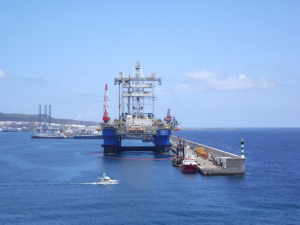No one disputes that offshore energy development carries environmental risks. Through its involvement in the new Ocean Energy Safety Institute (OESI), the University of Houston Cullen College of Engineering will play a key role in ensuring the safety of offshore energy production for years to come.
The institute is a partnership of UH, Texas A&M University and the University of Texas at Austin. The three schools recently won a competitive five-year, $5 million grant from the Department of the Interior’s Bureau of Safety and Environmental Enforcement to establish the institute. Its mission is vital: Serve a platform for communications and research among government, academia and industry in the field of offshore energy.
“The institute itself is going to act as a liaison between industry, regulators and the creators of the best available technologies in terms of safety and feasibility,” said Ramanan Krishnamoorti, professor of petroleum engineering and chemical and biomolecular engineering at the college and Chief Energy Officer for the University of Houston. “These technologies are going to come out of places like the Cullen College of Engineering. The college is a critical player in bringing cutting-edge academic research to subsea applications, where technology is rapidly evolving.”
As home to the only subsea engineering program in the United States, the Cullen College is an established leader in offshore energy education, Krishnamoorti noted. Through this program, students learn about the design and maintenance of the equipment and infrastructure used in the underwater portion of offshore petroleum exploration and drilling. The program began offering a master’s degree this fall and already has more than 48 M.S. students, on top of roughly 160 certificate students.
In addition to educational programs, several college faculty members are widely recognized as top researchers in the offshore sector. Their efforts (many of which were profiled in the most recent issue of Parameters, the college's research magazine) cover several aspects of offshore technology, including:
- Computer models for the design and operation of complete subsea systems that can account for everything from material and component fatigue to the price of oil on a given day;
- Smart cementing materials and drilling fluids that have sensing capabilities, allowing operators to monitor the structural health of every inch of a well;
- Environmentally friendly biosurfactants that can improve the sensing capabilities of advanced drilling fluids and can be used to disperse oil from a spill or leak;
- Smart materials that can help control the movement of underwater pipelines;
- Sensing systems that can identify the presence of oil on the water’s surface near unmanned drilling platforms, thereby providing 24/7 monitoring of these locations;
- Computer algorithms that can balance dozens of factors far better than humanly possible in order to maintain safe pressure levels in petroleum wells;
- Mechanical systems that can help prevent leaks and extend subsea infrastructure service life by absorbing infrastructure vibrations caused by water movement;
- Drilling fluid management systems (including novel sensors, actuators and controls) that can maintain fluid quality and cut the time and environmental load of drilling;
- Processes and procedures for consistent high-quality cementing of wells that can help control costs and improve well safety;
- Airborne sensing and mapping technologies that can define the extent of oil spills;
- Rock property studies that can help petroleum companies determine how to safely retrieve resources from different types of rock formations.
The college’s involvement in the institute should help these technologies find their way to real-world use more quickly, Krishnamoorti said. By providing a platform for partnerships with industry, researchers will have easy access to input and guidance from companies in the offshore sector. Likewise, Cullen College faculty members will be able to present their work to industry members on a regular basis thanks to their involvement with the institute.
Such partnerships will help bring the college some well-deserved recognition for its contributions in the offshore sector, added Joseph W. Tedesco, Elizabeth D. Rockwell Dean and Professor of the Cullen College.
“Offshore resources are going to contribute significantly to energy production in the years to come. The Ocean Energy Safety Institute will play an key role in safely and efficiently developing these resources,” he said. “I’m proud that our researchers are so prominently involved in this initiative and I look forward to seeing their advances adopted by companies in this sector.”
